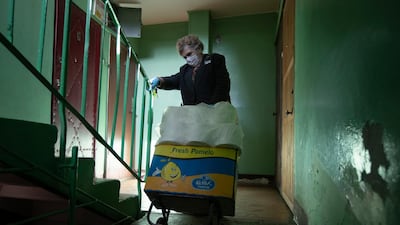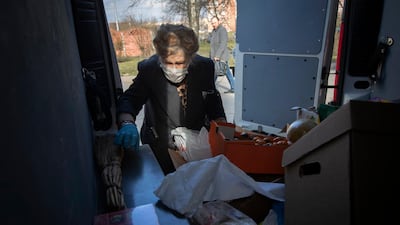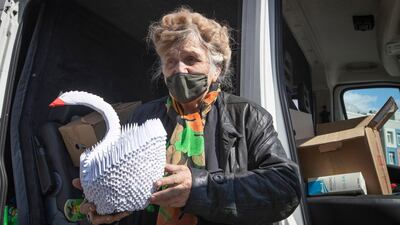As a child during the siege of Leningrad in the Second World War, Galina Yakovleva learned how to make the best of fearful times. Today she is using those lessons as she brings food and supplies to needy people locked down in the coronavirus pandemic.
The 80-year-old drives a white minivan every day through the city, now named St Petersburg, on a one-woman charitable mission for the elderly and needy families with children. She has been doing this for a decade and has not let the virus deter her.
“I’m not afraid of it; I drive my van alone,” she said. “My soul does not let me leave all my people in need without attention."
Russia's Covid-19 outbreak has surged in recent weeks, with a record daily rise of 11,231 new cases on Thursday pushing national case total to 177,160. The country's coronavirus task force said 88 people had died overnight, bringing the death toll to 1,625.
“I have arrangements with certain food stores and grocery depots on certain dates of the month," Ms Yakovleva said. "So if I don’t pick up what I am to get, that food will get spoiled and people who need it won’t get it.”
Wasting food is abhorrent to someone who went through the privations of the 1941-44 siege, when some 800,000 civilians died as supply lines were cut off and the city came under bombardment from Nazi forces.
“We never threw away anything. … How can you throw away bread?” she said.
The kindergarten she attended was bombarded, forcing her and some other children to hide in a cast iron pipe. The shock was so great that she did not speak for years afterwards, she says.
In adulthood, Ms Yakovleva held several jobs in which she learned skills that she now uses to collect and distribute aid: she drove a tractor, an ambulance and a trolley bus.
She set up her Dobrota (Kindness) Foundation about 10 years ago to help socially disadvantaged people. She built connections with the city food stores, bakeries, farms and even theatres.
The operation is a lifeline for more than 500 people.
Her activities have not changed much during the pandemic, except for some adjustments in picking up and delivering the goods. Men now load her van without direct contact with her and she sometimes leaves her deliveries on doorsteps.
But many of her care recipients still open the door for her and want to talk.
“I don’t know how I’d live here indoors for a month if not for Galina. She brings me milk, bread, everything so I won't die from hunger”, said Lyubov Travkina, 83. “I’m amazed. This person lives only for others, not for herself.”
“We should always think of helping others, at least a bit. Not just lie on the sofa,” Ms Yakovleva said.







